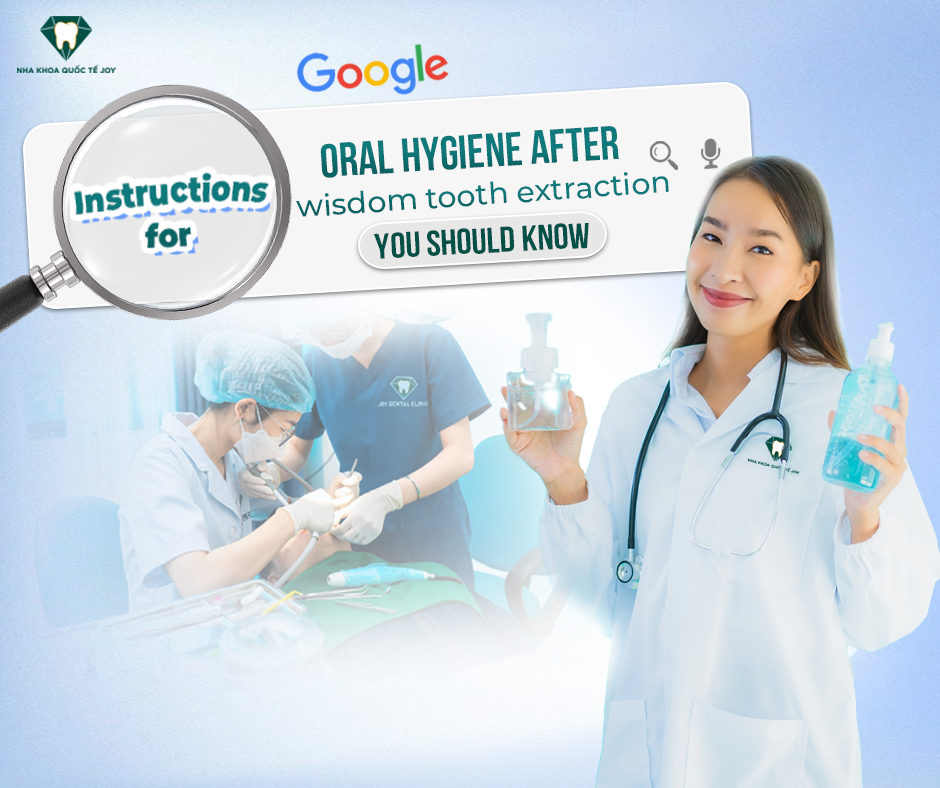Wisdom tooth extraction is one of the most common minor dental surgeries performed today. However, despite being a routine procedure, it requires careful post-operative care to ensure proper healing and prevent complications. Among the most crucial aspects of oral hygiene after wisdom tooth extraction. Maintaining good oral hygiene after wisdom tooth removal helps prevent infections, reduces swelling, and promotes faster healing. If you are unsure how to properly care for your oral health after undergoing this procedure, let Joy International Dental Clinic guide you with detailed and essential information in this article.
1. Why Is Oral Hygiene Crucial After Wisdom Tooth Extraction?

Maintaining oral hygiene after wisdom tooth extraction is not just a recommendation—it is an absolute necessity. The surgical site is extremely sensitive and highly prone to bacterial infections due to food debris and plaque buildup. Neglecting oral hygiene can result in a condition known as dry socket, where the blood clot protecting the wound is dislodged, exposing the underlying bone and nerves. This condition can cause severe pain, bad breath, and delayed healing.
Furthermore, poor hygiene can lead to bacterial infections, increasing the risk of swelling, pus formation, and even more serious complications requiring medical intervention. Therefore, taking proper care of your mouth after surgery plays a critical role in preventing these risks and ensuring a smooth recovery.
2. Essential Considerations for Oral Hygiene Post-Extraction
2.1 Selecting the Right Oral Care Products

To protect the extraction site and minimize irritation, use a soft-bristled toothbrush that gently cleans your teeth without damaging the sensitive area. Additionally, choose a fluoride-containing toothpaste to help prevent cavities and bacterial buildup. Avoid toothpastes with strong mint flavors or abrasive ingredients, as they can cause discomfort and irritation near the surgical site.
2.2 Proper Brushing Techniques
Brushing your teeth after wisdom tooth extraction requires extra caution. Avoid brushing directly on the extraction site for the first 24 hours. Instead, use gentle, circular motions to clean your teeth while steering clear of the affected area. As your mouth heals, you can gradually start brushing the surgical site using minimal pressure to prevent disturbing the blood clot.
2.3 Using a Mild Mouthwash or Salt Water Rinse

Mouthwashes containing alcohol should be avoided during the first few days, as they can cause irritation and dryness. Instead, opt for an antiseptic mouthwash recommended by your dentist, or rinse your mouth with a warm saltwater solution. However, it is crucial to rinse gently—vigorous swishing can dislodge the blood clot, leading to dry socket or prolonged bleeding.
3. Step-by-Step Oral Hygiene Routine After Wisdom Tooth Removal
3.1 Oral Care in the First Two Days
The first 48 hours after extraction are the most critical for healing. During this period:
- Do not brush, floss, or rinse directly over the surgical site.
- Avoid vigorous spitting, as it can dislodge the blood clot.
- Use gauze pads as instructed by your dentist to control bleeding.
- After the first 24 hours, you may gently rinse with salt water to keep the area clean.
- Keep your mouth as dry as possible—avoid excessive talking or licking the extraction site.
3.2 Oral Hygiene from Day 3 to Day 10
By the third day, you can begin resuming your normal oral hygiene routine with some modifications:
- Brush your teeth as usual but be extra careful around the extraction site.
- Use a mild antibacterial mouthwash or saltwater rinse after meals.
- Floss gently to prevent food particles from accumulating near the wound.
- If swelling or discomfort persists, continue applying a cold compress to the affected area.
3.3 Long-Term Oral Hygiene for Complete Healing
Even after a week, it is essential to maintain proper oral hygiene to prevent complications and ensure full recovery:
- Avoid using straws, smoking, or drinking alcohol, as these can slow down healing.
- Stick to a soft diet until you feel comfortable eating solid foods.
- Continue brushing and flossing daily, ensuring you clean all areas of your mouth without irritating the extraction site.
- Keep an eye on any signs of infection, such as persistent pain, pus, or unusual swelling.
4. Additional Tips for Post-Extraction Care
4.1 Following a Proper Diet

Your diet plays a significant role in your recovery. In the first few days:
- Stick to soft foods like yogurt, smoothies, mashed potatoes, and soups.
- Avoid crunchy, spicy, or acidic foods that could irritate the wound.
- Do not consume excessively hot foods and drinks, as heat can cause irritation and bleeding.
As your healing progresses, gradually introduce solid foods, ensuring you chew on the opposite side of the extraction site to avoid discomfort.
4.2 Adjusting Your Daily Habits
During the recovery period, some daily activities may need modification:
- Avoid heavy physical exercise for at least 48 hours to prevent excessive bleeding.
- Keep your head elevated while sleeping to minimize swelling.
- Stay hydrated, but avoid carbonated drinks or those with high sugar content.
4.3 Taking Prescribed Medications Correctly

Your dentist may prescribe pain relievers and anti-inflammatory medications to ease discomfort and prevent infection. Follow the prescribed dosage carefully and avoid self-medicating. If you experience unusual side effects such as rashes, difficulty breathing, or prolonged swelling, seek medical assistance immediately.
4.4 Monitoring Symptoms for Potential Complications
It is crucial to observe any signs of complications after wisdom tooth extraction. Seek immediate dental care if you experience:
- Severe pain that does not subside after taking prescribed medication.
- Excessive bleeding lasting more than 24 hours.
- Swelling that worsens after the third day instead of improving.
- Foul-smelling breath or pus discharge, which could indicate infection.
4.5 Attending Follow-Up Dental Appointments
Regular follow-up visits allow your dentist to monitor your healing progress and detect any early signs of complications. These checkups are essential for ensuring the extraction site is healing properly and, if necessary, removing any remaining sutures.
Conclusion
Maintaining proper oral hygiene after wisdom tooth extraction is essential for ensuring a smooth and complication-free recovery. By following the correct cleaning methods, adopting a suitable diet, and adhering to your dentist’s recommendations, you can minimize risks and promote faster healing. If you have any concerns or experience any unusual symptoms, do not hesitate to reach out to Joy International Dental Clinic for expert advice and care. Remember, proper oral hygiene today ensures long-term dental health and overall well-being.






